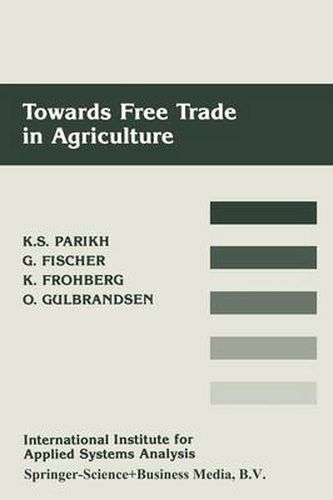Readings Newsletter
Become a Readings Member to make your shopping experience even easier.
Sign in or sign up for free!
You’re not far away from qualifying for FREE standard shipping within Australia
You’ve qualified for FREE standard shipping within Australia
The cart is loading…






This title is printed to order. This book may have been self-published. If so, we cannot guarantee the quality of the content. In the main most books will have gone through the editing process however some may not. We therefore suggest that you be aware of this before ordering this book. If in doubt check either the author or publisher’s details as we are unable to accept any returns unless they are faulty. Please contact us if you have any questions.
Agriculture seems to be a difficult sector to manage for most governments. Developing countries face tough dilemmas in deciding on appropriate price poli eies to stimulate food production and maintain stable, preferably low, prices for poor consumers. Governments in developed countries face similar difficult deci sions. They are called upon to give income guarantees to farmers whose incomes are unstable and relatively low when compared to those in the nonagricultural sector. These guarantees often lead to ever-increasing budgetary outlays and unwanted agricultural surpluses. High prices make new investments and the application of new technologies more attractive than world prices warrant, and a process is set in motion where technological innovation attains amomenturn of its own, in turn requiring price policies that maintain their rates of return. Surpluses are disposed of with subsidies in domestic markets or in the international market. Price competition reduces the market share of other exporters, who may be efficient producers, unless they are willing to engage in subsidy competition. This lowers export earnings and farm incomes or depletes the public resources of developing countries that export competing products. Retaliatory measures have led to frictions and further distortions of world prices. Every so orten the major agricultural exporters - the USA, the EC, Aus tralia, or Canada - accuse one another of unfair intervention. Though they have agreed to discuss agricultural trade liberalization under GATT negotiations, if anything, the expenditure on farm support has continued to increase in both the EC and the USA.
$9.00 standard shipping within Australia
FREE standard shipping within Australia for orders over $100.00
Express & International shipping calculated at checkout
This title is printed to order. This book may have been self-published. If so, we cannot guarantee the quality of the content. In the main most books will have gone through the editing process however some may not. We therefore suggest that you be aware of this before ordering this book. If in doubt check either the author or publisher’s details as we are unable to accept any returns unless they are faulty. Please contact us if you have any questions.
Agriculture seems to be a difficult sector to manage for most governments. Developing countries face tough dilemmas in deciding on appropriate price poli eies to stimulate food production and maintain stable, preferably low, prices for poor consumers. Governments in developed countries face similar difficult deci sions. They are called upon to give income guarantees to farmers whose incomes are unstable and relatively low when compared to those in the nonagricultural sector. These guarantees often lead to ever-increasing budgetary outlays and unwanted agricultural surpluses. High prices make new investments and the application of new technologies more attractive than world prices warrant, and a process is set in motion where technological innovation attains amomenturn of its own, in turn requiring price policies that maintain their rates of return. Surpluses are disposed of with subsidies in domestic markets or in the international market. Price competition reduces the market share of other exporters, who may be efficient producers, unless they are willing to engage in subsidy competition. This lowers export earnings and farm incomes or depletes the public resources of developing countries that export competing products. Retaliatory measures have led to frictions and further distortions of world prices. Every so orten the major agricultural exporters - the USA, the EC, Aus tralia, or Canada - accuse one another of unfair intervention. Though they have agreed to discuss agricultural trade liberalization under GATT negotiations, if anything, the expenditure on farm support has continued to increase in both the EC and the USA.